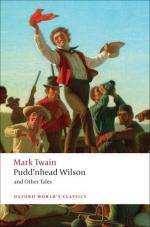The governor’s situation has been embarrassing, from the day of the condemnation, because of the fact that Clayton’s wife is the governor’s niece. The marriage took place in 1899, when Clayton was thirty-four and the girl twenty-three, and has been a happy one. There is one child, a little girl three years old. Pity for the poor mother and child kept the mouths of grumblers closed at first; but this could not last for ever —for in America politics has a hand in everything—and by-and-by the governor’s political opponents began to call attention to his delay in allowing the law to take its course. These hints have grown more and more frequent of late, and more and more pronounced. As a natural result, his own part grew nervous. Its leaders began to visit Springfield and hold long private conferences with him. He was now between two fires. On the one hand, his niece was imploring him to pardon her husband; on the other were the leaders, insisting that he stand to his plain duty as chief magistrate of the State, and place no further bar to Clayton’s execution. Duty won in the struggle, and the Governor gave his word that he would not again respite the condemned man. This was two weeks ago. Mrs. Clayton now said:
’Now that you have given your word, my last hope is gone, for I know you will never go back from it. But you have done the best you could for John, and I have no reproaches for you. You love him, and you love me, and we know that if you could honourable save him, you would do it. I will go to him now, and be what help I can to him, and get what comfort I may out of the few days that are left to us before the night comes which will have no end for me in life. You will be with me that day? You will not let me bear it alone?’
’I will take you to him myself, poor child, and I will be near you to the last.’
By the governor’s command, Clayton was now allowed every indulgence he might ask for which could interest his mind and soften the hardships of his imprisonment. His wife and child spent the days with him; I was his companion by night. He was removed from the narrow cell which he had occupied during such a dreary stretch of time, and given the chief warden’s roomy and comfortable quarters. His mind was always busy with the catastrophe of his life, and with the slaughtered inventor, and he now took the fancy that he would like to have the telelectroscope and divert his mind with it. He had his wish. The connection was made with the international telephone-station, and day by day, and night by night, he called up one corner of the globe after another, and looked upon its life, and studied its strange sights, and spoke with its people, and realised that by grace of this marvellous instrument he was almost as free as the birds of the air, although a prisoner under locks and bars. He seldom spoke, and I never interrupted him when he was absorbed in this amusement. I sat in his parlour and read, and smoked, and the




